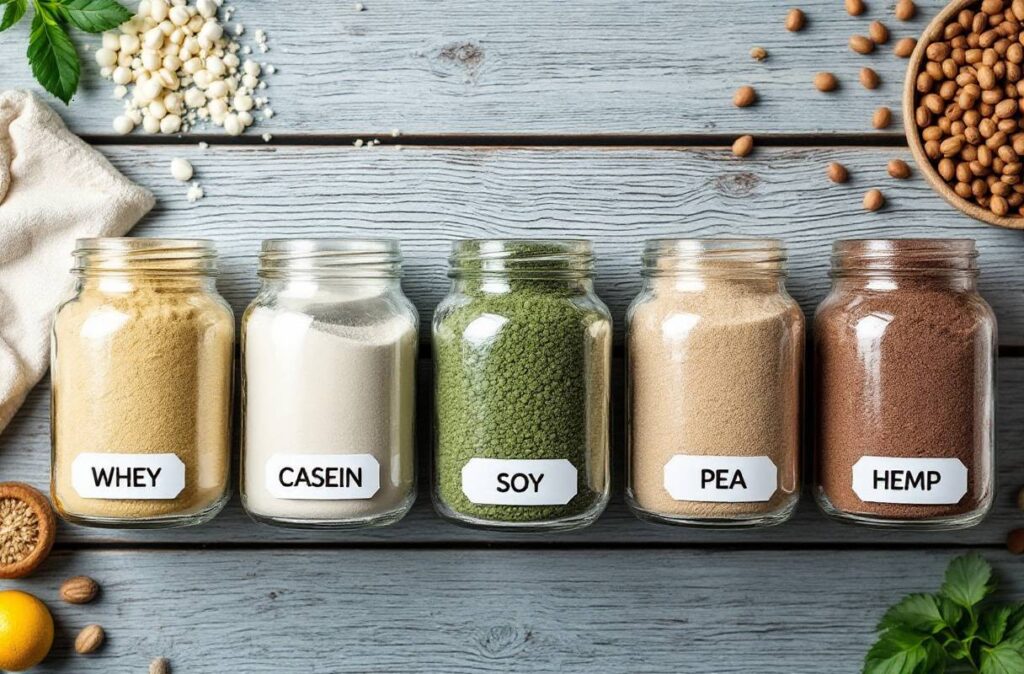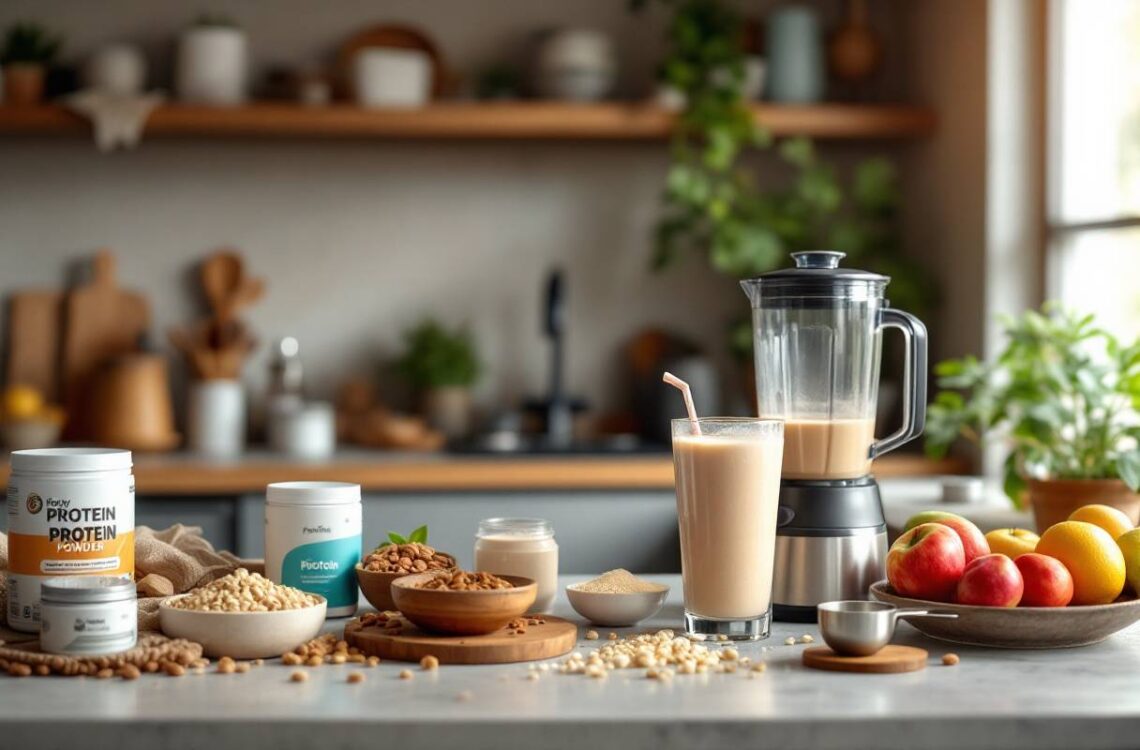Embarking on your fitness journey and feeling overwhelmed by the protein powder aisle? You’re not alone.
With countless options lining the shelves, choosing the perfect protein powder can feel like navigating a labyrinth of labels and promises. But fear not, fellow health enthusiast!
Whether you’re a gym newbie or a seasoned athlete, finding your ideal protein match doesn’t have to be a headache-inducing quest. In this guide, we’ll cut through the confusion and equip you with the knowledge to select a protein powder that not only aligns with your fitness goals but also tantalizes your taste buds. Get ready to power up your nutrition game and make every scoop count!
Protein is like the superhero of nutrients, swooping in to save the day for your muscles, growth, and body functions. If you’re into sports or staying fit, think of protein as your trusty sidekick. It’s there to boost your workouts and help you feel like a champ. Why is protein the star of fitness?
- Muscle Repair and Growth: After pushing your muscles to the limit, protein is their best friend, helping them bounce back and get stronger.
- Enhanced Recovery: It acts like a quick fix, minimizing those aches and pains after a workout.
- Strength and Endurance: More protein often means more power and stamina.
Understanding Protein Powder
Importance of Protein in Fitness
For those needing an extra boost, protein powders are a go-to solution. They’re an easy way to make sure your body’s getting its fill without breaking a sweat.
Role of Protein Powders
Protein powders are like a speedy delivery service for top-notch protein, making them a hit with bodybuilders, marathon runners, and health nuts. They do more than just bulk up your muscles:
- Convenience: Perfect for when you’re racing the clock. Just shake and sip.
- Versatility: Mix them in drinks, whip them into desserts, or bake them into snacks—protein powders can adapt to your taste buds.
- Customizable Nutrient Intake: Allows tweaking your protein to match your personal goals or dietary choices.
| Reason | Benefit |
|---|---|
| Convenience | Quick and easy to prepare |
| Versatility | Can be added to various foods and drinks |
| Customizable | Fits individual needs just right |
For anyone keen on hitting those protein goals, knowing your protein powder types is as key as picking the right shoes for a run. Dive into Whey vs Plant Protein for the lowdown. It’s packed with tips to help you choose the best powder for your unique journey.
Types of Protein Powders
Protein powders are like a buffet for your muscles, each with its own twist and turn. Here’s a sneak peek at the crowd favorites:
Whey Protein
Think of whey protein as the Rockstar—coming straight out of milk when cheese is in the oven. It’s packed with the good stuff (hello, amino acids!) and hits your muscles quicker than your post-gym smoothie. It’s a strong sidekick for muscle healing and growth, plus gives your immune system a little pep talk.
| Nutrient | Amount per Serving (30g) |
|---|---|
| Protein | 24g |
| Carbs | 2g |
| Fat | 1g |
| Calories | 120 |

Curious about how whey stacks up against plant protein? Check out the lowdown here.
Casein Protein
Here’s the night owl of the protein party, casein protein. Also getting its groove from milk, it takes its sweet time to digest. Perfect for a while-you-snooze steady drip of amino acids to keep those muscles happy until morning comes.
| Nutrient | Amount per Serving (30g) |
|---|---|
| Protein | 23g |
| Carbs | 2g |
| Fat | 1g |
| Calories | 110 |
Soy Protein
Soy protein is the go-to for the veg-heads and plant-lovers among us, straight from soybeans. It’s got all those magic amino acids, plays nice with your ticker, and beefs up your muscles minus the moo. Also filled with antioxidants to keep you feeling fine.
| Nutrient | Amount per Serving (30g) |
|---|---|
| Protein | 20g |
| Carbs | 7g |
| Fat | 2g |
| Calories | 150 |
For peeps interested in plant power, dive into more on vegan sports supplements.
Pea Protein
Say hey to pea protein, the gentle giant in the family. From yellow peas, it’s a friendly choice for folks dodging dairy and soy. It’s got those BCAAs your muscles love, while keeping hanger at bay.
| Nutrient | Amount per Serving (30g) |
|---|---|
| Protein | 21g |
| Carbs | 2g |
| Fat | 2g |
| Calories | 120 |
Rice Protein
Rocking out with rice protein, this one comes from brown rice. Super easy on the tummy and allergy-friendly, it’s a peacekeeper for sensitive systems. Pair it up with other pals like pea protein for a full amino acid fiesta.
| Nutrient | Amount per Serving (30g) |
|---|---|
| Protein | 24g |
| Carbs | 2g |
| Fat | 2g |
| Calories | 120 |
Hemp Protein
Hemp protein’s the chill guy in town, showing off with seeds packed with fiber. Loaded with omega-3 and omega-6, it’s got a side of antioxidants and minerals for good measure. A solid partner in crime for both muscle and health recovery.
| Nutrient | Amount per Serving (30g) |
|---|---|
| Protein | 15g |
| Carbs | 9g |
| Fat | 3g |
| Calories | 120 |
Picking the right protein is like matching shoes with your outfit—it’s gotta fit your style. Whether you’re pumping iron, racing like the wind, or rocking the vegan vibes, there’s a protein powder to jazz up your nutrition game and help you crush your goals.
Considerations for Choosing
Picking the right protein powder ain’t as simple as grabbing the first tub off the shelf. Here’s how to make sure you’re getting what’s best for your needs.
Protein Content and Quality
You want protein powder to pump up your intake, right? Make sure you’re getting the good stuff! Check those labels for top-notch protein and a full range of amino acids that your muscles will thank you for. Here’s a quick look at what different types of protein powders pack.
| Protein Type | Protein Content (per serving) |
|---|---|
| Whey Protein | 20-30g |
| Casein Protein | 20-25g |
| Soy Protein | 15-20g |
| Pea Protein | 15-20g |
| Rice Protein | 15-20g |
| Hemp Protein | 10-15g |
For a more detailed face-off, check out whey vs plant protein.
Not all proteins are created equal. The source of protein you choose can significantly impact your nutritional intake and fitness results.” – Dr. Jose Antonio, CEO of the International Society of Sports Nutrition
Dietary Restrictions and Allergies
Got dietary stuff going on? No worries. If lactose doesn’t like you, whey protein isolate might just be your buddy since it’s got less of the stuff. And if soy is no-go, skip soy protein. There’s a buffet of plant-based proteins like pea, rice, and hemp for vegans and vegetarians. Need more on plant power? Peep our piece on vegan sports supplements.
Personal Fitness Goals
What are you sweating for? Muscle gain? Shedding pounds? Running faster? Your goals help pick your powder. Bulking up? Load up with mass gainers (peek at best mass gainer supplements). Boosting that endurance? Add in some carbs with your protein. Trimming down? Go for low-calorie powders packed with vitamins and minerals.
Taste and Mixability
Man, taste matters! You don’t want to dread your shakes. Pick a protein powder that won’t make you gag and blends smoothly, whether it’s with water or in a smoothie. Don’t be shy—experiment with different flavors and mixtures to find what tickles your taste buds.
Choosing the right protein powder is like dating—try a few to find your perfect match. Keep tabs on protein content, respect dietary needs, align with fitness dreams, and enjoy every sip. Dig into more goodies in our articles on post-workout recovery supplements and best protein bars.
Reading Labels
Walkin’ down the protein powder aisle these days can make your head spin. With a bazillion options staring at you, knowing how to make sense of those labels is crucial if you’re choosin’ a protein powder. Let’s break down some tips to help you avoid the nasty stuff and pick a powder that’s good for ya.
Understanding Nutrition Labels
Crackin’ the code on those nutrition labels means you know you’re snaggin’ a top-notch protein powder. Check out the serving size—keep an eye on protein, fat, carbs, and sugar numbers. This’ll clue you in on how the protein jives with your health kick or diet goals.
| Nutrient | Typical Amount per Serving |
|---|---|
| Protein | 20-30 grams |
| Fat | 1-3 grams |
| Carbohydrates | 1-5 grams |
| Sugars | 0-2 grams |
Usually, high protein with low fat and sugar is the holy grail, whether you’re beefin’ up or slimmin’ down.
Checking for Additives and Fillers
Scope out that ingredient list like a hawk to dodge any unnecessary fillers and dodgy additives. Fake sweeteners, thickeners, and preservatives are the kinds of stuff you wanna steer clear of.
Be on the lookout for these sneaky additives:
- Artificial Sweeteners: Names like aspartame, sucralose, or saccharin ring any bells?
- Thickeners: Watch for xanthan gum or carrageenan tryna thicken things up.
- Preservatives: Sodium benzoate, potassium sorbate, and other chemical names that sound like a lab experiment.
Usually, the less complicated the ingredient list, the better. Go natural, especially if you’re after something like clean, vegan sports supplements.
Common Label Terms
- Isolate: It’s the “ain’t-nothin’-but-whey,” usually 90% protein. Less fat, less tear-jerking lactose.
- Concentrate: Comes with 70-80% protein, along with a sidekick of fats and carbs.
- Hydrolysate: Kind of a fast-track option, gets into your system quicker, might even be kinder if you’ve got some allergies.
Once you know these terms and what the nutrition numbers mean, settlin’ on somethin’ that hits your personal fitness goals gets a whole lot easier.
Internal Links
- Discover how protein powders make a difference in your post-workout recovery supplements.
- Dive into the whey vs plant protein debate to see what suits you best.
- If shredding’ those pounds is your gig, check out our tips on effective fat burner supplements.
Mastering the art of label-readin’ sets you up for success, lettin’ you pick a protein powder that’s spot-on for your health goals and fitness ambitions.
Mixing and Consumption
Figuring out when and how to gulp down your protein shake is just as vital as picking the right one. Here’s the scoop on when to chug your protein and how to mix it up right for max results.
Pre-Workout vs. Post-Workout Timing
Timing that protein hit can seriously impact your gains. Grab some before or after you break a sweat, each has its own perks.
Pre-Workout Protein: Downing protein before you hit the gym can flood your muscles with amino acids, which helps patch up and bulk that muscle. Think of it as a fuel boost for your killer workout.
Post-Workout Protein: Slurping up some protein after your session is a must for bouncing back and bulking up. It patches up the muscles you worked out, helping them recover and grow faster.
| Timing | Benefits | Examples |
|---|---|---|
| Pre-Workout | More amino acids while you exercise, powered-up muscles | Top pre-workout shakes, Natural energy boosters |
| Post-Workout | Recover quicker, pump those muscles | Recovery boosts, How glutamine helps |
Mixing Suggestions and Recipes
Whipping up your protein powder right is key to soaking up all that goodness. Check out some ways to keep it tasty and nutritious.
Simple Protein Shake: Toss a scoop of your fave protein with water or milk in a shaker bottle for a smooth, fast gulp that’s low on calories.
Smoothie: Blend protein powder with fruits, veggies and a liquid like water, milk, or a plant-based pick. Go wild with peanut butter, oats or seeds for a nutrient punch.
Protein-Packed Oatmeal: Mix protein powder into oatmeal and top with nuts, fruits, and a bit of honey for a power-packed breakfast.
| Recipe | Ingredients | Instructions |
|---|---|---|
| Simple Protein Shake | Protein powder, water/milk | Shake ingredients well in a shaker bottle |
| Smoothie | Protein powder, fruits, veggies, liquid | Blend until it’s smooth sailing |
| Protein Oatmeal | Protein powder, oatmeal, nuts, fruits | Mix in the protein, add tasty stuff |
Try out different mixes to find your sweet spot in taste and health. For more recipes and tips, check out our take on top protein bars or stamina boosters.
Plant-Based Protein Powders
Benefits of Plant-Based Proteins
Whether you’re a gym buff or just someone who appreciates a good smoothie, plant-based protein powders bring a lot to the party. Plucked from Mother Nature herself, these proteins pack a nutritional punch with all those must-have nutrients and amino acids.
- No Allergic Drama: Forget dairy disasters; these plant buddies dodge the allergen landmines common in animal proteins.
- Loaded with Good Stuff: Think fiber for your tummy and antioxidants for your well-being, all bundled in a neat plant package.
- For Everyone’s Plate: Perfect for vegans and vegetarians, these proteins won’t have you breaking any food vows.
- Earth-Friendly Goodness: They leave a smaller footprint on Mother Earth compared to their animal counterparts.
Take a deeper dive with our other write-up on how whey stacks up against plant-based protein.
Choices for Veggie and Vegan Sportsters
Plant-based protein powders aren’t just a one-size-fits-all deal. There’s a buffet of choices tailored for vegetarian and vegan athletes looking to pump up without the animal by-products. Let’s introduce the headliners:
| Protein Type | Source | Protein Content (per scoop) | Key Highlights |
|---|---|---|---|
| Pea Protein | Yellow peas | 15-25 grams | BCAA powerhouse, no allergen worries |
| Rice Protein | Brown rice | 15-22 grams | Digestive-friendly, ace for allergy-prone folks |
| Soy Protein | Soybeans | 20-25 grams | Full amino lineup, muscle-loving |
| Hemp Protein | Hemp seeds | 15-20 grams | Omega-rich, high-fiber champ |
Pea Protein
Straight from those vibrant yellow peas, pea protein stands tall with branched-chain amino acids (BCAAs) at its core, ideal for beefing up and bailing out muscles after a workout. Allergies? Not here. Consider it your best gym buddy if you’re skittish around certain foods.
Rice Protein
For those nights when brown rice is your go-to, think of rice protein as its buff older sibling. It’s gentle on the stomach and often mixes with other proteins for that full amino backing. It’s a safe harbor for sensitive eaters amid the protein storm.
Soy Protein
Soy protein doesn’t just dabble; it’s got all the amino goods your body craves. Big win for muscle repair and growth if that’s your jam. Plus, it’s heart-friendly, keeping that ticker of yours in check. Endurance athletes can thrive on its long-lasting energy boost.
Hemp Protein
Coming from hemp’s heart is this protein that’s rich in those good omega fats. It’s like a two-for-one special: heart health and inflammation busting. Plus, with a bonus of fiber, it won’t just fill you up; it’ll keep things moving.
Curious to explore more muscle-loving, animal-free options? Our feature on vegan sports supplements has you covered.
With a clear grasp of plant-based protein powders, athletes will find themselves well-armed to chase those fitness dreams, stay true to their dietary choices, and say no to animal by-products without missing a beat.
Potential Side Effects
Protein powders are like the secret sauce to sprucing up your fitness game. But hey, let’s not sideline the potential hiccups—they’re key to picking the right one.
Timing and Quantity
Getting the timing and amount just right saves you from any unwanted surprises. Gobbling too much can toss you into a world of woes, and if you’re off on timing, the magic kind of fizzles out.
| Protein Intake | Timing and Quantity Guidelines |
|---|---|
| Pre-Workout | 15-25 grams, lifts your energy and stamina levels. |
| Post-Workout | 20-30 grams, your muscles’ best friend for repair and growth. |
| Daily Intake | 0.8 grams per kg for casual workouts, up to 1.6 grams per kg for when you’re training like a beast. |
Keeping it on track with when and how much you chug can supercharge the perks while dodging those pesky side effects. For more juice on timing, grab some tips on pre-workout supplements and post-workout recovery supplements.
Digestive Sensitivity
Protein powders aren’t all the same—some might turn your stomach into a gurgling symphony of bloats and gripes. Know your body’s party crashers to keep things mellow.
| Protein Type | Digestive Details |
|---|---|
| Whey Protein | Might throw a bloat-fest if you’re lactose-sensitive. |
| Casein Protein | Takes its sweet time to digest and might cause some belly grumbles. |
| Soy Protein | May throw a fit if allergies are a thing; stomach might stage a protest. |
| Pea Protein | Usually a peacekeeper, unless your tummy’s a tough crowd. |
| Rice Protein | The chill option—easy to digest and rarely misbehaves. |
| Hemp Protein | High in fiber, could get things moving but maybe a jumpstart with bloating. |
If lactose isn’t your thing, plant-based powders are your pals—dig into more in our vegan sports supplements write-up. And the great debate—whey vs plant protein—has got your comfort covered.
Watch your body’s reaction and tweak things instead of throwing a wrench in your routine. Chatting with a nutrition guru might just be the smooth move for any extra guidance.
Consultation and Advice
Seeking Guidance from a Nutritionist or Dietitian
Finding the right protein powder can feel like searching for a needle in a haystack, with options galore at your fingertips. Turning to a nutritionist or dietitian might just be your golden ticket to sidestep the chaos. These pros don’t play around, offering custom advice to fit your unique profile—be it your fitness ambitions, dietary quirks, or pesky allergies.
When you sit down for a chat, here’s what you can expect:
- Dietary Preferences: Into plant power or all about the whey? A nutritionist can point you the right way. If you are leaning plant-based, check out our piece on vegan sports supplements.
- Allergies and Sensitivities: They’ll help dodge those ingredients that might send you running, suggesting safer alternatives.
- Fitness Goals: Whether bulk-up or slim-down, they’ll tailor your protein plan. Need tips on supplements? Peek at our article on post-workout recovery supplements.
Professional Recommendations for Individual Needs
How much protein do you need? Well, it depends—on your workout goals, eating habits, and how you’re feeling overall. These experts know their stuff, and they’ll clue you in on what types of protein and how much you should be going for.
Bodybuilders and the muscle-obsessed crew: you’re gonna need top-shelf protein. Knowing what’s the deal with whey, casein, and all that jazz is like Protein 101. Dive into the scoop on whey vs plant protein.
Endurance is key for our running and cycling pals. They need protein that keeps energy steady and helps muscles bounce back. Check out endurance supplements for more on that.
For the regular gym folks and those just trying to stay fit, a nice mix of protein and other nutrients keeps the balance right. Dig into goodies like creatine supplementation and glutamine benefits to level up your fitness game.
A quick rundown in the table for what you should be aiming for with your protein:
| Fitness Goal | Recommended Protein (g/kg body weight) |
|---|---|
| Muscle Gain | 1.6 – 2.2 |
| Endurance | 1.2 – 1.4 |
| General Fitness | 0.8 – 1.0 |
Got allergies or special dietary needs? No worries! A nutritionist can make sure your protein blends with your daily routine, no hitch. For a speedy protein fix, our best protein bars guide’s got you.
Bottom line: Having a knowledgeable sidekick in the protein powder jungle is priceless. Whatever your fitness story, expert advice makes sure you’re getting the perfect fit.
Stay tapped into our site for more tips and insights on fitness supplements—your protein journey starts here!
Conclusion
Selecting the perfect protein powder doesn’t have to be a daunting task. Armed with the knowledge of different protein sources, your specific fitness goals, dietary restrictions, and taste preferences, you’re now equipped to make an informed choice. Remember to prioritize quality, read labels carefully, and don’t shy away from sampling before committing to a large tub. Whether you’re reaching for that post-workout shake or blending a nutritious smoothie, the right protein powder can be a game-changer in your fitness journey. So go ahead, flex those decision-making muscles, and choose a protein powder that not only fuels your body but also delights your palate. Your perfect protein partner awaits – here’s to powering up your potential, one scoop at a time!
Additional Resources
American Council on Exercise (ACE) – Protein Powder Basics:
https://www.acefitness.org/education-and-resources/lifestyle/blog/6674/protein-
Journal of the International Society of Sports Nutrition – Protein timing and its effects on muscular hypertrophy and strength:
https://jissn.biomedcentral.com/articles/10.1186/1550-2783-10-53
FAQs
1: How much protein do I need daily?
The recommended daily protein intake varies based on factors like age, gender, and activity level. Generally, adults need 0.8g per kg of body weight, but athletes and those looking to build muscle may need 1.2-2g per kg.
2: Is whey protein better than plant-based protein?
Neither is universally better. Whey is a complete protein and is quickly absorbed, making it ideal for muscle building. Plant-based proteins can be equally effective when properly combined and are suitable for vegans or those with dairy allergies.
3: Can protein powder replace meals?
While protein powder can be used as a meal replacement occasionally, it’s not recommended to regularly substitute whole foods with supplements. Whole foods provide a broader range of nutrients essential for overall health.
4: When is the best time to consume protein powder?
The timing depends on your goals. For muscle building, consuming protein within 30 minutes post-workout can be beneficial. For general nutrition or weight management, timing is less crucial.
5: Are there any side effects of consuming protein powder?
Most people tolerate protein powder well. However, excessive consumption may lead to digestive issues, unnecessary weight gain, or strain on the kidneys in people with pre-existing conditions. Always consult with a healthcare professional before starting any supplement regimen.




